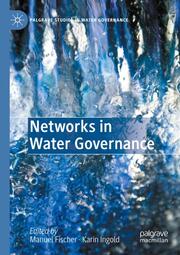Detailansicht
Networks in Water Governance
Palgrave Studies in Water Governance: Policy and Practice
ISBN/EAN: 9783030467715
Umbreit-Nr.: 2699529
Sprache:
Englisch
Umfang: xx, 333 S., 7 s/w Illustr., 22 farbige Illustr., 3
Format in cm:
Einband:
kartoniertes Buch
Erschienen am 20.08.2021
Auflage: 1/2020
- Zusatztext
- With the consequences of climate change and biodiversity loss becoming more and more apparent, both the protection of water resources and water-related ecosystems as well as protection from water, that is flood protection policies, have become increasingly important. This book explores the latest applications of network analysis concepts and measures to the study and practice of water governance. Given the holistic complexity of water governance, it covers individual water governance aspects such as flood protection and fisheries, as well as overarching concepts like integrated water management and social-ecological interactions. The book provides an overview of current water governance issues, network analytic concepts as well as implications for practice. The main body of the text is made up of eight case studies by world-leading environmental governance scholars, each of which addresses one water-related challenge by applying a variety of network approaches. The first part of the book highlights network dispersion and fragmentation, the second focuses on how such fragmentation in networks can be overcome and the third deals with specific roles of actors in networks. This collection is a key resource for scholars and practitioners interested in water governance all over the world. It provides readers with an overview of the potential of network analytic concepts for research on complex governance problems.
- Kurztext
- With the consequences of climate change and biodiversity loss becoming more and more apparent, both the protection of water resources and water-related ecosystems as well as protection from water, that is flood protection policies, have become increasingly important. This book explores the latest applications of network analysis concepts and measures to the study and practice of water governance. Given the holistic complexity of water governance, it covers individual water governance aspects such as flood protection and fisheries, as well as overarching concepts like integrated water management and social-ecological interactions. The book provides an overview of current water governance issues, network analytic concepts as well as implications for practice. The main body of the text is made up of eight case studies by world-leading environmental governance scholars, each of which addresses one water-related challenge by applying a variety of network approaches. The first part of the book highlights network dispersion and fragmentation, the second focuses on how such fragmentation in networks can be overcome and the third deals with specific roles of actors in networks. This collection is a key resource for scholars and practitioners interested in water governance all over the world. It provides readers with an overview of the potential of network analytic concepts for research on complex governance problems.
- Autorenportrait
- Manuel Fischer is a research group leader at the Department of Environmental Social Sciences at the Swiss Federal Institute for Water Science and Technology (Eawag) and a lecturer at the Institute of Political Science at the University of Bern, Switzerland. His research deals with water and environmental governance and policy-making. Karin Ingold is a professor at the Institute of Political Science and the Oeschger Center for Climate Change Research at the University of Bern, Switzerland. She is also affiliated to the Environmental Social Science Department at the Swiss Federal Institute for Water Science and Technology (Eawag). She is interested in policy design and politics of climate change, water and energy.
